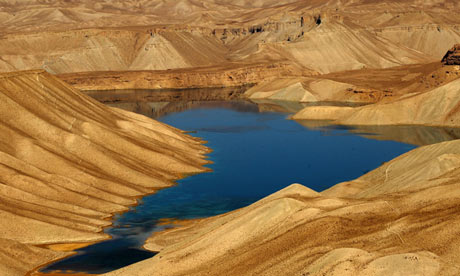
There is a bland, almost corporate flavour to the title of Khaled Hosseini's third book, suggesting a large but windy Afghan epic. Its narrative wares are clearly advertised in the book-jacket blurb to reassure his tens of millions of worldwide readers that they will be getting the brand they want. This effectively marketed product informs its consumers that, as there was in The Kite Runner, here there will also be siblings separated by hardship and tragedy. There will be nostalgia for old Afghanistan, ironised by its clashes with western freedoms and shattered by modern wars; there will be leaps in time, speaking of the cruel tricks of history through wildly emotive tales of loss, betrayal and redemption.
"You want a story and I will tell you one," Hosseini begins, with a device that informs his readers exactly what is what and who is who. It is 1952. A father presents his children with a fable as they embark on a journey through the mountains of the book's title, a myth to prepare them for the coming rupture in their lives, one that will echo down generations.
But the threat of bland formula is instantly dissolved in Hosseini's elemental narrative chemistry. The opening myth is a substance that permeates a network of tales, its meaning developing and diversifying across 400 pages. A div, or demon, draws a father into a terrible pact. The father can gift his favourite son a better life by giving the child away, never to see him again. This is what Saboor, the poor Afghan father telling the story, is himself about to do to his three-year-old daughter, Pari, who has an unusually powerful bond to her brother, Abdullah. From the moment the realisation dawns that Saboor is going to give Pari to the wife of a wealthy man in Kabul, Hosseini saturates the various layers and characters of his novel with a yearning for the moment that brother and sister will reunite.
"A story is like a moving train," as Hosseini has one of his many tale-telling characters remark, "no matter where you hop onboard, you are bound to reach your destination sooner or later." True enough, but Hosseini isn't restricted to any single route, or mode of transport. He is a master of that deeper narrative principle: get your audience where they want to go, but not in the way they expect.
Digressing across a web of family connections, he delays gratification without frustrating desire. He guides a multi-layered narrative tantalisingly away from the siblings' denouement through characters you initially assume are merely foils, but who instead become gripping destinations in their own right: the first stepmother, Parwana, who is not merely a psychological cue for childhood unhappiness, but the bearer of a sibling sorrow of her own; the uncle, Nabi, who makes the deal that separates the children, but turns into the book's lightning rod of sympathy; Pari's new stepmother, Nila Wahdati, who callously removes Pari to France for a new life but transforms, for all her unattractiveness, into one of the novel's more compelling creations.
While events ricochet between countries, Hosseini's recurrent concern is the same: the relationship of Afghanistan to the wider world; what its traumas have done to those who remain and what happens to those who leave and then come back to rediscover their country. Two expats, Timur and Idris, return to reclaim a house in Kabul, near the one to which Pari was first stolen away. Idris, the sensitive doctor, is embarrassed by their Americanised attitudes and the power that money bestows on them. But through him, Hosseini turns a simplistic critique of the US into a nice irony. The culturally sophisticated Idris turns out to be ineffectual. It is the crass and ethically dodgy Timur who gets things done and makes a difference.
By the time Hosseini finally gets round to the reunion, via a Greek aid official living in the house in Kabul where Pari was adopted, he has compressed a dozen life stories into his novel and unified them through an irresistible substance of yearning. His end is not quite the expected coming together but, instead, a trigger for memory.
And the Mountains Echoed charges its readers for the emotional particles they are, giving them what they want with a narrative facility as great as any blockbusting author alive. Perhaps there is some hokey emotional chemistry at work here, but, in the process, Hosseini is communicating to millions of people a supple, conflicted and complex picture of his origin country, Afghanistan.

